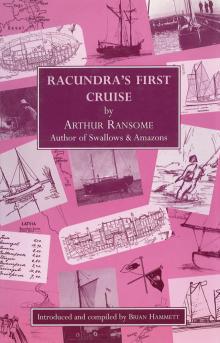- Home
- Arthur Ransome
Missee Lee: The Swallows and Amazons in the China Seas Page 4
Missee Lee: The Swallows and Amazons in the China Seas Read online
Page 4
“Land,” said John. “Quite near.”
“I wish we knew where we were,” said Susan.
“We knew last night,” said John. “We were right in the steamer track. But of course that storm upset everything. That’s why he wanted the sea-anchors out, partly, so that we’d stay where we were and keep together. But with ours going, of course, we’ve been moving all the time.”
FIRST SIGHT OF CHINA
“I bet theirs went too,” said Roger.
“They may be quite near,” said Titty.
“They’d have shouted,” said Susan.
“We wouldn’t have heard them in that wind,” said John.
“Let’s try now,” said Titty.
They hailed, all together. “Ahoy! … Ahoy … oy … oy!”
There was no answer.
“Pieces of eight!” shouted the parrot.
“Funny, Polly shouting in the dark,” said Titty.
“It isn’t dark,” said Roger. “Look over there.”
“Dawn coming,” said John.
“John,” said Susan suddenly. “I smell cinnamon.”
“I smell all sorts of smells,” said Roger.
“I believe we’re quite close in,” said John. “Lucky the wind dropped when it did.”
They turned from looking at the faint light in the eastern sky.
“There’s something showing,” said Roger.
“Hills,” said Susan.
“China,” said Titty.
“If only we were all together,” said Susan, and then … “We’d better have something to eat while we can. …”
Dawn in the tropics comes up as fast as dusk comes down. While they were eating rations of dates and chocolates it flared up out of the east. They stared at the shore and at each other, strangers all after that night of storm. They saw a coast-line of brown hills that, as they watched, turned to rose-grey above a belt of green forest. John, cramming the last of his chocolate into his mouth, turned to the bows and presently, hand over hand, quite easily now that there was no pull on it, was hauling in the rope from the sea-anchor.
“Hullo,” he cried as he came to the end of it. “It wasn’t my fault after all. It was the anchor itself that bust, not the rope.” He held up the remains of the sea-anchor, a wooden ring with rags of grey canvas hanging from it. “Canvas rotten. Or perhaps some sparks burnt a hole and started it fraying. Well, if ours went, very likely theirs went too.” He looked out hopefully again over the sea. There was not a thing in sight. He made up his mind.
“Look out, John,” said Susan.
“Sorry,” said John, who was tugging to get the oars clear of the mast and sail. “I’m going to row in.”
Where the land was nearest to them there was a patch of green forest with a great cliff behind it rising high into the sky. To the left the land was much lower. To the right the trees seemed to be growing out of the sea. The hill behind them, not so tall as the cliff, had the shape of a great cat with its head resting on its paws. John got out the oars, put the rowlocks in their places, pulled the boat round and glancing over his shoulder, began to row.
“Where are we going to land?” asked Roger.
“Those trees under the cliff,” said John. “Nearest place.”
“Couldn’t we sail?” said Titty.
“Not enough wind,” said John. “Rowing’s better, and with the sunrise behind us, we’ve got a good chance of getting ashore without being seen.”
“But don’t we want to be seen?” said Roger.
“Let’s have a look at the people first,” said John. “If they look beastly we can sheer off.”
“They wouldn’t do anything to shipwrecked sailors,” said Titty.
“I do wish the others were in sight,” said Susan.
John rowed on, stopping only for a moment at a shout from Roger. “There’s a road going up that cliff. … Let’s have the telescope.”
They all searched the dark face of the cliff and saw what Roger had seen, a scratch sideways and slantways across the rock, another scratch above it, and yet another, a track, or at least a path. And a path meant people.
“Captain Flint did say we’d be picked up if we stayed where we were,” said Roger.
Susan looked doubtfully out to sea, rolling green water stretching to the sunrise.
“We can’t get back there,” said John. “We’ll try here, and if people are beastly we’ll just have to dodge along the coast.”
“I can’t see any people anywhere,” said Titty, who had been having a turn with the telescope, though it was hard to keep it steady as the little Swallow rose and fell.
“All the better,” said John, and settled again to his rowing.
Nearer and nearer they came towards the cliff.
“There’s a bit sticking out to meet us,” said Roger. “That bit with the trees.”
“That’s what I’m going for,” said John. “Got to find a place where we can land without smashing her up.”
“Pull left,” said Susan a few minutes later. “I say, John, it’s a promontory. … There’s quieter water behind it.”
John pulled his left. Palm trees, other trees the names of which they did not know, were close to them, and below the trees were dark rocks and stony beaches on which the swell from the sea crashed in thunder and white spray. He must keep clear of that. He rowed on, keeping his distance from the shore, and then, coming to the end of the trees, began to turn in towards the cliff. Suddenly they were in smoother water.
“Gosh!” exclaimed Roger. “It’s not a cape. It’s an island.”
They could see now that there was a wide channel of smooth water between the trees and the cliff.
“Good,” said John. “There’s our place. … Keep a lookout for rocks under water.” He pulled suddenly with his starboard oar, and headed in for a little beach.
“Let me get in the bows,” said Roger.
John waited a moment while Roger scrambled into his usual place. Then he rowed on. Susan was watching the water on one side, Titty on the other.
“Pull right,” shouted Roger, and as John did so, Titty saw a black knob of rock slip by in the green depths.
“Pull left,” shouted Susan, and John dodged another.
“Look here,” said John. “If she bumps we must all be ready to hop overboard and take her up. Whatever happens we mustn’t get her stove in.”
But only a moment later there was a gentle scrunch and Roger was ashore. Gibber, whom Roger had let out of his bag, climbed over everything and everybody and was ashore a moment after Roger. John stepped out into a foot of water.
“Pretty near high-water mark,” he said. “But we’ll get her up as far as we can.”
All four heaving together pulled Swallow her own length up the beach. John laid out her anchor among the roots of the trees.
“China,” said Titty.
John looked carefully round. “Even from the top of the cliff nobody can see her in here,” he said.
CHAPTER IV
WHAT HAPPENED TO AMAZON
I
“TALKEE ENGLISH BIMEBY”
WIND and the darkness had come together. There was a biggish sea running but the little Amazon, lying to her sea-anchor, was riding it well. Nancy and Peggy, tired after the shock of the fire, were sleeping fitfully in the stern. Captain Flint, with a corner of the centreboard digging into his back to keep him awake, was looking in the direction where he had last seen it for a glimmer of Swallow’s lantern. There was not a sign of it, but that did not disturb him much. In a hard wind, in a tossing boat, the lantern might very easily have gone out and John would have found it by no means easy to light it again. There came a lull. He listened for a hail from John and then hailed himself, “Swallow, ahoy!”
Nancy and Peggy woke with a start, heard him, looked round in the darkness and hailed with him, “SWALLOW! AHOY!”
And then the wind freshened again and was blowing as hard as ever.
“No good,” said Captain Fl
int. “They couldn’t hear us and we couldn’t hear them.”
“I say, Uncle Jim, why aren’t they close to us?”
“Where’s their lantern?”
“Gone out. Lucky ours hasn’t. Have they got torches?”
“John has, anyway,” said Peggy.
“Well, now’s the time to use it,” said Captain Flint.
“I say, you do think they’re all right?”
“Better off than we are,” said Captain Flint. “No centreboard case to prod into their ribs.”
“Swallow did capsize once, but that was only because of a rock. …”
“She didn’t capsize then, you tame galoot. Don’t you remember? She just holed herself and sank and her mast went clean over her bows.”
“She wouldn’t capsize without her mast and sail up,” said Captain Flint. … “Anyway, not if they kept down in the boat, and John would see to it that they did. And there are no rocks out here. She’ll be all right. Shut up, you two, anyway. Go to sleep, it’s no use yelling in a wind like this. You go to sleep till dawn and we’ll find them then. …”
“But they were only a few yards off. …”
“Shut up,” said Captain Flint. “There’s nothing to be done till daylight.”
*
A second time Nancy and Peggy were waked by a roar from Captain Flint.
“AHOY! SHIP AHOY!”
They started up and stared about them, blinking at the hurricane lantern that Captain Flint was holding up and waving. Had he caught sight of Swallow’s lantern? Had he seen the flash of a torch?
“AHOY! … SHIP AHOY!” he shouted.
“Where?” said Nancy. “What is it?”
“Chinese fisherman, probably,” said Captain Flint. “No sidelights, of course. AHOY!” he shouted again.
“There,” cried Peggy. “Look … look … She’s right on us.”
A dim light was swaying towards them.
“SHIP AHOY!” roared Captain Flint, and then, “Why doesn’t that idiot, John, show a torch? They may easy run him down if they don’t see him.”
The light, swaying towards them over the seas, brightened. There was a shout. Captain Flint shouted back. Suddenly, thirty or forty yards away, a door opened. They saw people, black shadows flitting across a square patch of light. They heard the crash of water under the bows of a ship.
“You take the lantern, Nancy,” said Captain Flint. “Ship the rowlocks, Peggy. Don’t stand up. …”
Nancy, kneeling on the floorboards, holding firmly to the middle thwart with one hand, held the lantern above her head with the other. Captain Flint had begun by jerking the oars loose and then, seeing how close the ship was, he grabbed the painter and began coiling it, coil after coil, making ready to throw.
“She’s seen us,” he said.
A voice shouted out something in an unknown language. Lanterns were moving on the deck of the strange ship. A splash from her bow wave came aboard.
“Heave to and give us lee,” yelled Captain Flint.
The black wall of the ship’s side towered above the Amazon. Then as the little boat lifted on a sea, they caught a glimpse of the deck, a path of light from a cabin door, a faint shifting glow on a dark sail, the black knobs of heads looking over bulwarks with the light dim behind them.
“Stand by for a rope there,” Captain Flint roared. They saw his right arm with the coil of rope swing back and then shoot forward again. They heard a shout above them. There was a violent jerk.
“Crazy lunatics,” yelled Captain Flint. “You’ll have us stove in.”
There was a crunch as the little boat swung in against the larger vessel which, though she had checked her way, was still slowly forging ahead. The next moment Nancy’s lantern was knocked from her hand as someone landed heavily aboard. She found herself lifted, grabbed from above and somehow on all fours on the deck of the ship. In the dim light of lanterns she saw half-naked figures at the rail. “Hey … la.” There was a shout and Peggy was dumped beside her. She heard Captain Flint shouting to people to take care. The next moment he too came almost flying over the rail. He scrambled to his feet. … “Look out, you. …” He could not get near the rail. There was a shout from below. A dozen men started yelling all together, “Hey … la … Hey … la. …”
“Look out,” shrieked Nancy. “You’ll smash her.”
Amazon was coming over the rail, tipping sideways and emptying oars, mast, sail, ration box and everything else that was in her down on the deck.
“Yi!” Somebody squealed as something heavy came down on a bare foot.
“Where’s your skipper?” said Captain Flint. “There’s another boat close by.” He took a torch from his pocket and began flashing it in hopes of an answering signal from John.
A moment later the torch was snatched from his hand.
“Who’s the skipper here?” he asked angrily.
“Swallow, ahoy!” shouted Nancy.
“Swallow, ahoy!” shouted Peggy.
“AHOY!” roared Captain Flint.
There was a terrific hubbub of other people all shouting at the same time, clearing the tangle of Amazon’s gear. It was instantly stilled by an order from somewhere aft.
“Gosh!” exclaimed Captain Flint. “The scoundrels are going to sail on. Hey! I tell you there’s another boat. … Another boat. … Where’s your skipper? … Doesn’t any of you talk English?”
“Talkee English bimeby.” A voice sounded almost at his elbow, and then gave another order. A voice answered out of the darkness aft. Men ran to obey. Somewhere forward there was the flap of a sail filling suddenly with wind.
Captain Flint, roaring, rushed aft. “Heave to, I say. … There’s another boat!”
There was a crash. Then a rush of bare feet, a scramble, curses, a thud. Half a dozen men bumped something along the deck. In the light of a lantern Nancy and Peggy saw that the something was Captain Flint. Men had him by the feet and by the shoulders. They hove him up and swayed towards the bulwarks.
“NO!” shouted Nancy.
Another moment and Captain Flint would have been thrown overboard. But Nancy’s “NO!”, a single, violent, determined word, shouted close beside them, startled the men. That moment saved him. A quiet voice, the same that had been giving orders, spoke again. There was a moment’s grumbling, and the men, hauling Captain Flint with them, disappeared through an open door under the foredeck. The ship was sailing. The deck was dark once more.
“They’ve killed him,” said Peggy.
Nancy grabbed Peggy’s hand and hurried her along, feeling through the dark towards the place from which the orders had come. She crashed into something, almost fell, tripped over a rope, saved herself and stumbled on.
She was stopped by hearing the voice immediately in front of her.
“Talkee English bimeby.”
“You’ve killed him,” she stormed. “And what about the Swallow? There’s another boat.”
“Not dead. … Him mad,” said the voice.
“There’s another boat,” cried Nancy. “You must pick her up. We can’t go on without them. …” She stamped her foot.
The voice spoke again, not in English. Hands seized them both by the wrists, and, stumbling in the dark, they were run forward along the deck. A door was opened. They were pushed into a small cabin lit by a lantern hanging from a beam. The door was closed behind them. They were alone.
Round three walls of the cabin there was a low bench, with a wide shelf three or four feet above it. People could have slept on the bench or on the shelf. In one corner lay a bundle of rugs. Peggy went to look, turned back, and sat down as far from them as possible.
“NO!”
“Nancy,” she said. “I … I’m going to be sick.”
“No, you aren’t,” said Nancy hurriedly. “Not in here.”
She tried the door and found it fast. “No,” she said, “you jolly well aren’t. … Nothing to be sick about. … Ow, I did fetch myself a crack. …” She limped across the cabi
n and sat down by Peggy.
“Captain Flint’s dead,” said Peggy.
“Of course he isn’t,” said Nancy.
“And what about the Swallow?” said Peggy.
“Not prisoners, anyhow,” said Nancy. “And we are. Do you know what that thing was I bumped into on deck?”
“No.”
“Cannon,” said Nancy. “At least I’m almost sure. … What’s that tapping?”
“Somebody hammering.”
“Shut up. …” Nancy listened. Outside there was the noise of the wind, the crashing of sea, the creaking of the masts. This noise was nearer … tapping, somewhere inside the ship … below … Tap … Tap … and then again Tap … Tap … Tap. …”
“Just a rope,” said Peggy.
“It’s under our feet,” said Nancy. “Wait. … Listen. … Long and two shorts. … Long and two shorts. … It’s Uncle Jim. … It’s the calling-up signal. Who says he’s dead?” She knelt on the floor and began tapping with her knuckles. Short, two longs. … Short, two longs. … The other tapping stopped, and then began again.
Peggy, forgetting that she had felt sick, flung herself on the floor beside Nancy. The tapping was certainly coming from somewhere below them, but a little further forward in the ship. Slowly a question came through. Nancy tapped an answer.
“What did he say?” asked Peggy. “He’s going too fast for me.”
“He’s all right,” whispered Nancy. “I’ve told him we’re all right too. … Shut up. … What’s that? He’s off again. ‘Keep … your heads … sorry … I … lost … mine. … Good thing really they didn’t get the others. … They will be picked up by a decent ship. … Bad luck our meeting fishermen. …’” Nancy banged the floor and violently tapped a message back. “I’m telling him about the cannon,” she translated to Peggy.
She paused and listened.
There was a short reply.
“He says, ‘Bunk.’… But it couldn’t have been anything else.”

 Peter Duck: A Treasure Hunt in the Caribbees
Peter Duck: A Treasure Hunt in the Caribbees Racundra's First Cruise
Racundra's First Cruise Great Northern?
Great Northern? Swallowdale
Swallowdale Swallows and Amazons
Swallows and Amazons Winter Holiday
Winter Holiday Missee Lee: The Swallows and Amazons in the China Seas
Missee Lee: The Swallows and Amazons in the China Seas Pigeon Post
Pigeon Post We Didn't Mean to Go to Sea
We Didn't Mean to Go to Sea The Firebird and Other Russian Fairy Tales
The Firebird and Other Russian Fairy Tales Coot Club
Coot Club The Big Six: A Novel
The Big Six: A Novel Six Weeks in Russia, 1919
Six Weeks in Russia, 1919 Secret Water
Secret Water The Big Six
The Big Six Missee Lee
Missee Lee Peter Duck
Peter Duck The Picts and the Martyrs
The Picts and the Martyrs